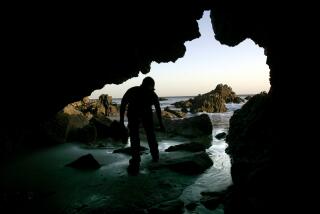State parks to stay open, but with cuts in hours, staffing
- Share via
SACRAMENTO AND LONG BEACH — Backing away from the possible closure of dozens of state parks, Gov. Arnold Schwarzenegger announced a plan Friday that would keep them all open for now, but warned that most would see reduced hours of operation and maintenance levels.
Park supporters welcomed the news that there would be no closures, but some expressed serious concern about the cutbacks, noting that the reprieve is only for the current fiscal year, which ends in June 2010. The park system faces a larger budget cut of $22 million next year.
“The implications of this remain grave for the department,” said Elizabeth Goldstein, president of the California State Parks Foundation, a group that works to protect the state’s 279 parks and beaches. She expressed concern about public safety if lifeguards and rangers work fewer hours.
Schwarzenegger sparked a public outcry this summer when he slashed $14.2 million from the Parks and Recreation Department’s budget and agency officials announced as many as 100 parks would have to close.
The governor directed state agencies to craft a plan to reduce closures and cuts in services as much as possible.
“Working closely with my departments of Finance and Parks and Recreation, we have successfully found a way to avoid closing parks this year,” Schwarzenegger said. “This is fantastic news for all Californians.”
The governor’s aides acknowledged that his office received a “significant” number of phone calls, e-mails and letters opposing any park closures.
“Clearly he is trying to heal a self-inflicted wound,” Goldstein said.
But Jeff Macedo, a spokesman for Schwarzenegger, said “the governor has always wanted to find a solution to keep the parks open.”
The resulting plan will mean some parks, or portions of them, will be open only on weekends and holidays, said Ruth Coleman, the state parks director.
Parks that already close for seasonal conditions may see a longer closure, she said. In many cases, restrooms may be cleaned only once a day, she said.
Daniel Jacobson of Environment California said the group was “thrilled” that governor had found a way “to make sure people continue to have a beautiful place to enjoy and recreate” in a year where the state had to plug a budget shortfall of nearly $60 billion.
About $12.1 million will be saved by reducing ongoing maintenance for the remainder of the year and eliminating all major equipment purchases, including vehicle replacements. The reductions in hours of operation, cuts in seasonal workers and reduction in staffing at headquarters will save an additional $2.1 million, Coleman said.
How each park will reduce its hours or days of operations is still to be determined by regional superintendents in the coming days, according to Roy Stearns, a park spokesman. He said virtually every park will be affected.
No date has been set for the new operating hours.
If a large park is shut early and the staffing at the gate goes home, state officials still expect people to enter the park and use it, even if only by foot or bike.
“How would we stop them?” Stearns said. “That’s not costing us any money if they walk in and are not doing anything to the park.”
“I’m happy we’re not closing any parks, but I’m very much aware that there are going to be service reductions throughout the system,” said Channel Coast District Supt. Rich Rozzelle, who operates 11 state parks on budget of about $7 million.
“It’s going to be a challenge to continue to provide a safe environment for the public with a reduction in my budget,” he said. “It will mean fewer staff and potentially fewer days.”
Lynne Haigh, president of the Topanga Canyon Docents and organizer of the campaign to keep Topanga State Park open, expressed mixed feelings.
“Certainly, this doesn’t fix the problem of funding state parks,” she said. “But I’m very happy that Topanga State Park will remain open a while longer.”
Carolyn Schoff, president of the Friends of Pio Pico State Historic Park in Whittier, said the announcement “is not good news for us.”
“We don’t want our parks to close, but it’s not clear what it means for our park and others across the state,” she said. “It’s sort of like telling someone, ‘We’re not going to lay you off, but we’re going to cut back your hours so much that you can’t maintain your home or pay your bills.’ ”
The need to find an additional $22 million in savings or new revenue to keep all parks open next year has park supporters, including Goldstein, continuing to explore placing a measure on the November 2010 ballot to create a vehicle license fee as a permanent source of park funding.
--
louis.sahagun@latimes.com
More to Read
Sign up for Essential California
The most important California stories and recommendations in your inbox every morning.
You may occasionally receive promotional content from the Los Angeles Times.















